Last Saturday night, as the audience readied itself for the Atlanta Opera’s opening performance of Donizetti’s Don Pasquale for the first time in the company’s history, the ante was unexpectedly raised. Following his customary salutations and the announcement of next season’s offerings, General Artistic Director Tomer Zvulun reported on the indisposition of the evening’s Ernesto, tenor Ji-Min Park, and confidently predicted an overwhelming success for his cover, Argentinian tenor Santiago Ballerini. A brief investigation of the insert hastily included in the program notes reminded us of Mr. Ballerini’s debut the previous year as a memorable Tybalt in Gounod’s Romeo et Juliette while then a member of the company’s young artist program, in addition to an important debut with the Caramoor Festival as Fernand in Donizetti’s La Favorite. Caramoor’s concert format would essentially make Mr. Ballerini’s substitution as Ernesto as his professional onstage debut in a principal role. Thus, before the maestro had made his way to the podium, an even greater sense of occasion had permeated the evening.
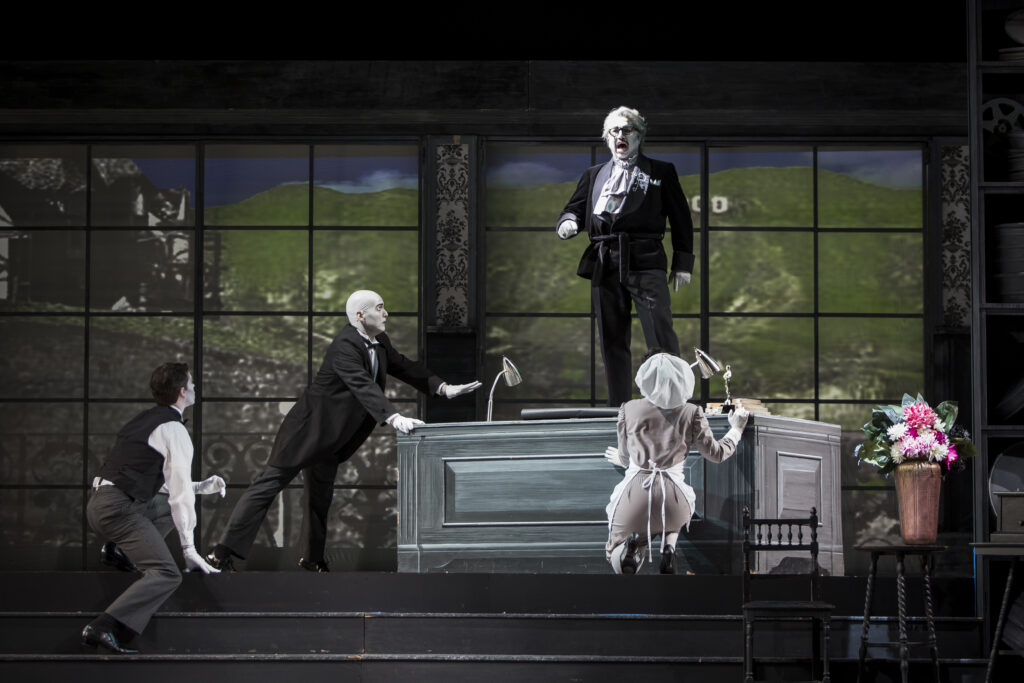
Photo Credit: Raftermen Photography
Thankfully, the audience did not need to wait long as Mr. Ballerini made his entrance early on in the first act. A quiet anticipation greeted his arrival, and the brief moment which precludes his first utterance gave a chance to assess his stage deportment. He is a young man of short stature, yet of trim and solid build. His features are quite agreeable and his eyes are expressive, handsome and melancholy. Initially, the overtly nasal and forward placement of his opening line (“E vero”) gave cause for some alarm. As the recitative progressed, this propensity was thankfully corrected, giving way to the light duettino (“Prender moglie?”) where he gave further hint of a slight and delicate tenore di grazia of great promise. When the opportunity afforded the undivided attention of those present, by way of the aria “Sogno soave e casto” he fulfilled the expectations in a way rarely heard in this city in quite some time.
The voice is a honeyed sigh, sweet in tone and wistfully floated over the orchestra and into the auditorium by a graceful and rapid vibrato. The complications of the solo (frequent ascends to A flat being amongst them) were accomplished with apparent ease, but what held the audience completely captive was the artful articulation of his song, the rapt realization of his legato, and the dreamy quality of his phrasing as he finished every measure with a sustained fil di voce. More specifically, it was the voice matching the verve of the score so perfectly, like tasting real cheese after years of Velveeta, that subjugated the audience into rapt silence so as to not spoil its every sampling of each precious warbling. In the ensuing cabaletta (“Mi fa il destin mendico”) he displayed an efficient proficiency in florid singing by conquering the disjunct leaps to the B flats with remarkable accuracy and all the while never stressing his vocal attributes in the process. The ovations that greeted his efforts served as a staunch reminder to business minded voices in opera today that insist on defacing opera to appeal to the twitting masses. Mr. Ballerini never took his shirt off to be relevant, rather he tapped into the sacred vein that runs through the core of all operatic presentations since the beginning of this art form. He gave you voice, the most satisfying and visceral of all currencies to be found within the riches of the operatic genre, and like a good peddler, he left the audience yearning for more.
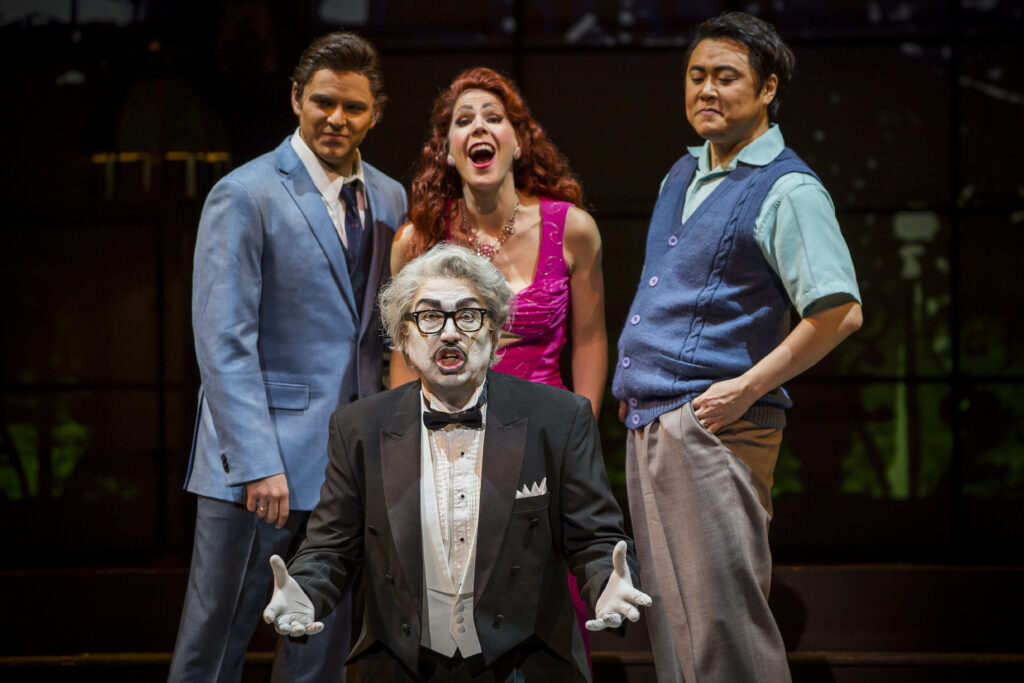
The opening of the opera’s second act presented Mr. Ballerini with his most challenging test, the compound scena beginning with the lament “Cherchero lontana terra” and ending with the cabaletta “E se fi ache ad altro oggetto”. The sentiment in both these numbers is highly introspective and pained, perhaps giving a window into the soul of the aging composer at that period of his life. The tessitura of both numbers is viewed as uncomfortably exposed and high for most tenors who want to give the scena its full weight (Donizetti wrote the role for the legendary Giovanni Mario), and it is often the case that an Ernesto who shines in the first act may come to grief in the second. Thus a sense to trepidation greeted the trumpet solo that anticipates the melodic line of the cavatina. Mr. Ballerini rose to the occasion and intelligently husbanded his resources and imbued each ascending measure with genuine morbidezza. The scene clearly tested his method, and he is a young man who can still make up with nature what technique has not yet shielded. We hope for his sake (and ours) that he will work on polishing a happy balance between the two. His participation in the ensembles that close the opera’s second act pitted his resources against those of his colleagues, and his voice rang out clear and free by way of that well-knit quiver of a vibrato which allows his deceptively small instrument to travel to the back of the auditorium. For his serenade in the final act (whenever the stage antics allowed him to be heard, tisk tisk) was poised, deliciously phrased and hallmarked once again by that enchanting vibrant tone that made his first act so magical. In the duet with Norina that followed, his polish recalled Cesare Valletti. Mr. Ballerini’s reaction to the ovation that greeted his curtain calls were moving. Quite overcome, he waved at the audience and pressed his hand to the stage. It is not certain whether he will keep his part for the remainder of the run of Don Pasquale, but he is scheduled to return next season as Tonio in Donizetti’s La fille du regiment. And he better. His was, to be sure, the most promising debut to be made on the stage of the Cobb Energy Center since the Atlanta Opera made it its home in 2008.
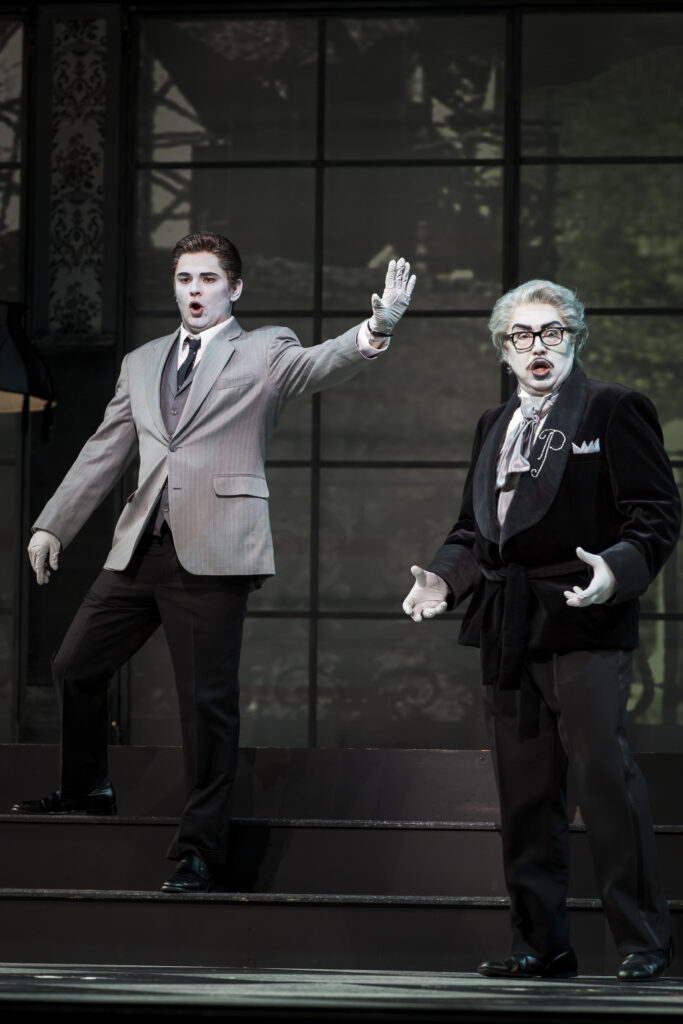
Photo Credit: Raftermen Photography
Pitting the remainder of the cast against such auspicious debut would seem almost unfair. Yet the Atlanta Opera company deserves much credit in their casting the remaining three principal roles. Playing the role of Ernesto’s cunning love interest Norina was soprano Georgia Jarman. Last seen to great acclaim in Atlanta six years ago as Donizetti’s Lucia, Ms. Jarman has made a specialty of bel canto heroines and would seem a natural choice to portray the part. Overall, she was a charming Norina, though her success was not as complete as that of her leading man’s. Hers is a lovely lyric soprano voice that is not quite as idiomatic in this music as Mr. Ballerini’s, and one that needed some time to find its tracking. The deceptively challenging part launched the singer into the famous “So anch’io la virtu magica” with no preparation, and a tentative quality and occasional stridency was noticed throughout the intricate passagework that caps the complicated second half of the scene. Her trill was uneven, yet serviceable. As the aria gave way to the duet with Malatesta (“Pronta io son”), she was able to relax, and her singing gained a rounder quality and greater poise in execution.
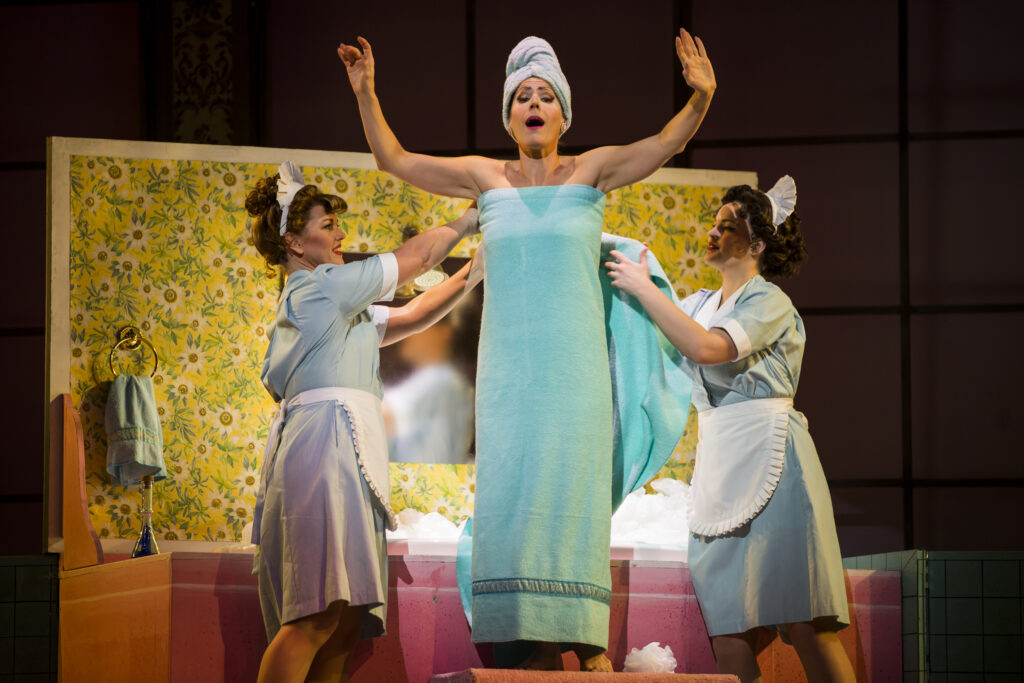
To showcase the zany side of her character, Ms. Jarman intelligently relied on extraneous devices to make her mark, seemingly in the spirit of the adaptation at hand, by her stage business and significant physique du role. As applied to her singing, she abused certain vocal affectations (sudden shrieks, welps, etc) to underline her feisty disposition. These were naturally present during the aforementioned duet with Malatesta, and most pronounced during the finale of the second act. Here, the crucial digs into the chest voice, a requirement for the unveiling of shrewed Sofronia to pack its full effect, were present but not as a distinguished feature. Things would settle on her favor during the third act as Norina’s cruel russe on Don Pasquale culminated in an cruel slap. Here, the unexpected turn of events validated her voice into attaining a deeper substance that briefly recalled her tragic Lucia. Her voice filled the phrases of her ensuing waltz “Via, caro sposino” with a shimmery glow and a pointed brilliance as it pressed upward. She carried this quality to the final duet with Ernesto (“Tornami a dir che m’ami”), surprisingly blending her resources to Mr. Ballerini’s (whose instrument is considerably different in declamatory style and timbre) in remarkable harmony. Her final rousing of the finale was charmingly sung and tastefully embellished. As far as Norinas are concerned, these proclivities were standard in modern casting, but the overwhelming aspects of the production may have exacerbated the usual predispositions which have compromised her previous work. I will explain. The raw material of her instrument is of an extremely pleasing silvery quality, but as projected by the artist it stops short of making a genuine and lasting aural impression. Her delivery is often slightly muted and passive, and though the singing is generally proficient and even accomplished, it is not terribly incisive or memorable. This is not to discredit her efforts, for the role of Norina is quite challenging and Ms. Jarman’s technique allows her to do justice to a more than substantial part of the score, but we fear that the expressive possibilities of the role were not fully realized in her hands. It may be argued that taking the dominant elements of the production into account, she may have rightly felt that she didn’t need to.
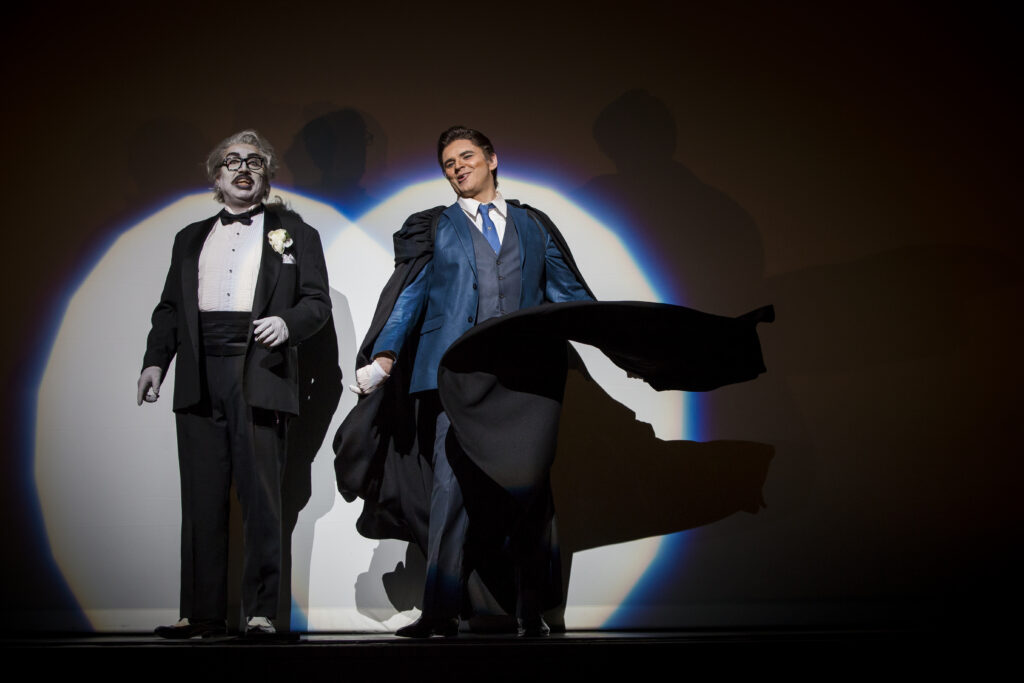
The singing of bass-baritone Burak Bilgili provided a different take away, with his characterful Don Pasquale showing through despite the many distractions layered upon it. Lacking an aria proper (a curiosity for a title character in operas of this period) Mr. Bilgili took every available opportunity through the various conversational interludes and ensembles to round up an impersonation that honored Donizetti’s score. During his one brief solo “Un foco insolito”, his rich, tremolous instrument gathered up enough vigour to manage all but the most persnickety permutation dictated by the composer. At times, the frenetic pace dictated from the pit got the better of him, forcing him to eat his share of measures during his rollicking stretta “Son tradito, calpestato” which brings down the curtain in the second act. The opera’s famous duet, “Cheti cheti immantinente”, served as his vindication, and he had a worthy partner in the Doctor Malatesta of Russian baritone Alexey Lavrov. In contrast with the Don’s, Mr. Lavrov’s voice was of a cooler timbre, alert, and as sampled during his opening solo “Bella siccome un angelo” focused to an exciting edge when required. He was also the most versatile comedian, and made a most favorable impression in this, his Atlanta Opera debut.
At the pit, also making his first appearance in Atlanta, conductor Joseph Colaneri may not have managed to get all the players in both pit and stage to agree to his vision (the orchestra was uncharacteristically fuzzy). This notwithstanding, he led the orchestra with palpable excitement and kept the proceedings galloping at a brisk tempo, at times even making the principals chase after him.
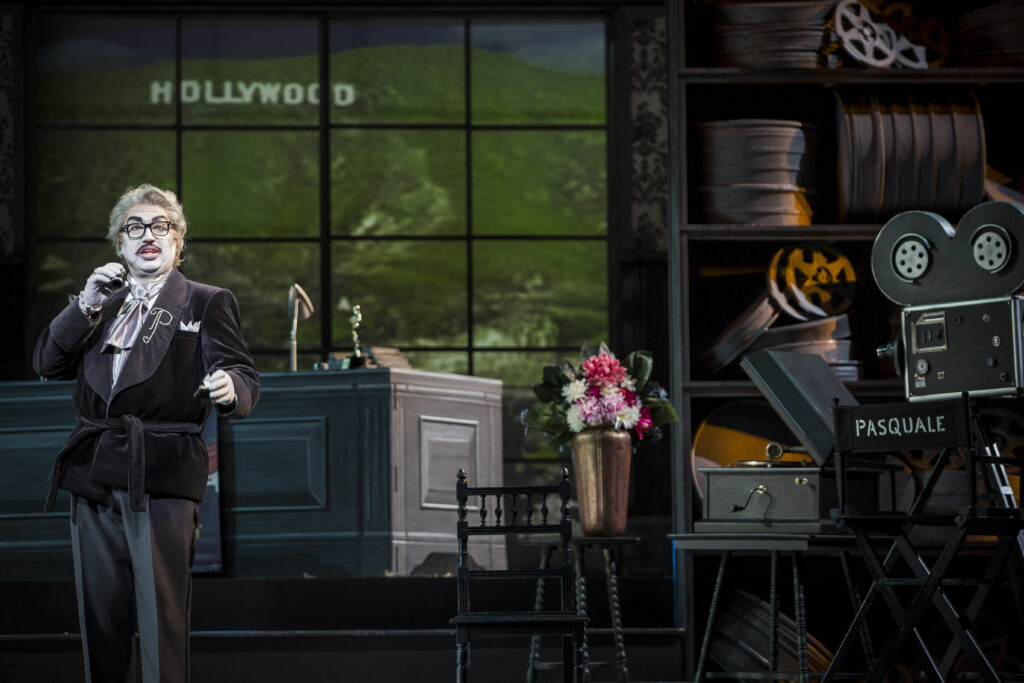
One of the driving arguments for re-adaptation lies with the claim that the audience is so far removed from the situation depicted in the libretto, and it is necessary to adjust the time and place to make the proceedings relevant and more easily digestible. Though this argument has led scholars to challenge the value and at times absurdity of the practice (as well as called out a general lack of faith in contemporary audience’s ability to adjust), productions of Don Pasquale often enhance the controversy with evidence that this very debate was held between Donizetti and his librettist, the poet Giovanni Ruffini, who famously quarreled extensively during the creation of the opera. While Donizetti favored a contemporary, 19th century staging so the audience would see itself reflected on the stage, Ruffini preferred to set the action back a century to a time period he felt was more appropriate for the archeotypal characters in the play. The reinterpretation of the opera to 1950s Hollywood, which came to Atlanta by way of the Arizona Opera with dazzling sets by Peter Nolle and handsomely costumed by Kathleen Trott, afforded the Atlanta Opera company with the opportunity to side with either of these stances. Don Pasquale is thus reinvented from a 70 year old wealthy 19th century bachelor into a Rudolf Valentino-Norma Desmond hybrid. A fallen has-been star casualty of the talkies revolution decimation of the silent film era. At face value, it would seem that the choice leaned toward’s Ruffini’s favor (a removed setting to illustrate a less direct yet greater truth), yet the production proved so overladen with extraneous details (added unto the opera to make the new concept “work”) that it quickly relegated both Donizetti and Ruffini quite literally to the background. What remained was a heartfelt tribute to Stage Director Chuck Hudson’s mentor, the legendary French actor Marcel Marceau, a conclusion further underlined by the fact that in the Stage Director’s essay on the production included in the program notes, Marceau is referenced frequently, yet Donizetti is mentioned only once.
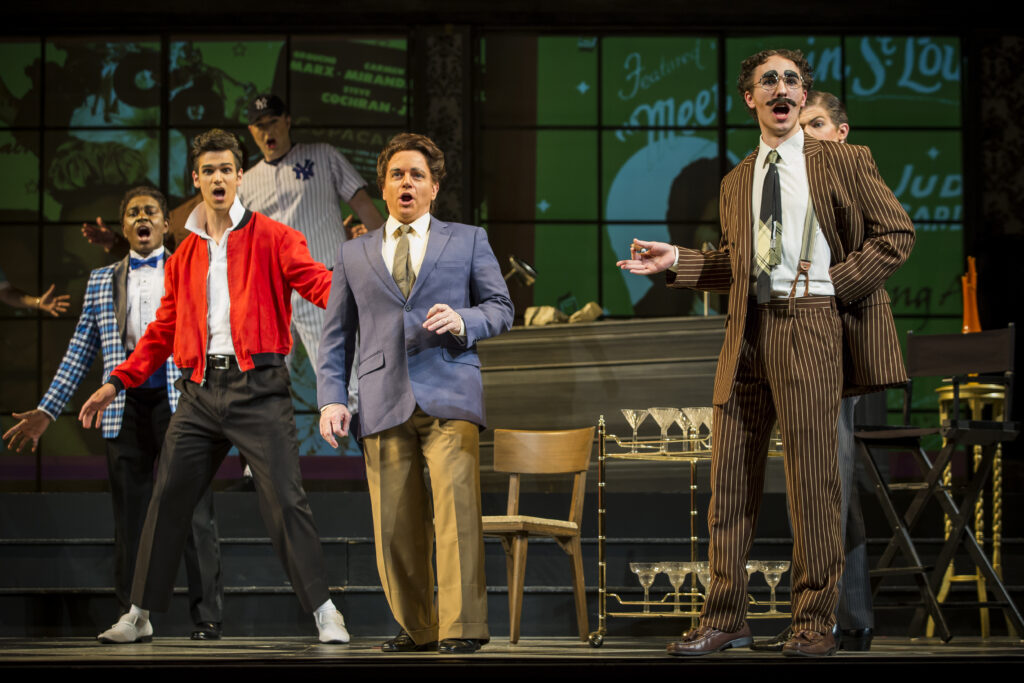
To be perfectly frank, the production is funny. It is stuffed to the brim with gags and many, like the business with the cape and the “over reaching” for the keychain, added to the individual celebrity impersonations from the members of the brilliant Atlanta Opera Chorus delighted the audience, yours truly included, throughout the night. If the company’s goal was to send the audience out giggling as it fought its way home through the evening traffic by establishing that Marcel Marceau and Chuck Hudson (making his directorial debut with this run of performances) are funny guys, then it was most certainly mission accomplished. If the goal was to present Donizetti’s comedy to its audience, and not merely as sound-track to an interpolation, then the conclusion deserves reassessment.
There are two more performances of Donizetti’s Don Pasquale remaining this week, and tickets are going fast. For more information, please visit the company’s website at www.atlantaopera.org
-Daniel Vasquez